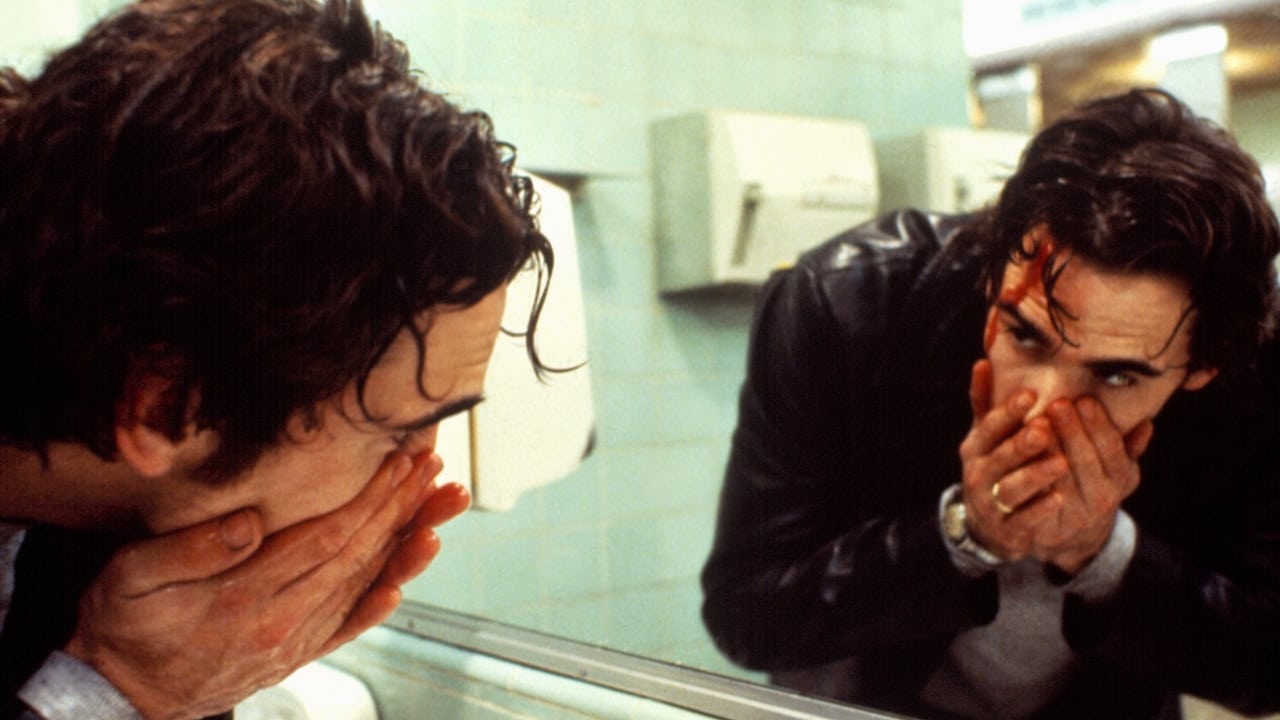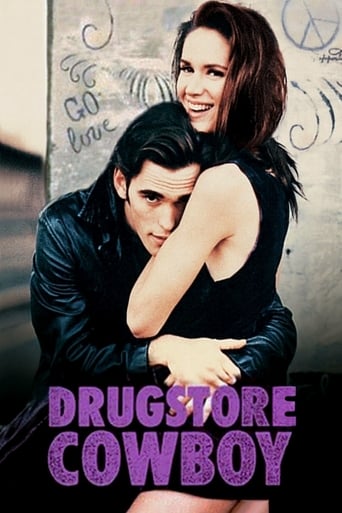

Gus Van Sant's sophomore effort is a reference-worthy entry into two separate, though occasionally linked, genres: the outlaw road movie and the drug film. Its title works on both levels. The term "drugstore cowboy" is an idiom for those who get high on prescription medication, and the film's protagonist, for a time anyway, has the swagger and rugged quality of a cowboy. What outlaw and addict movies often share are characters who generally don't see themselves as bad people, who certainly don't strive to be bad people, yet they just can't help but make a bad situation worse.In Drugstore Cowboy, Van Sant follows a ragtag group of users who get their kicks (and their next hit) from knocking off pharmacies. At the head of the group is Bob (Matt Dillon), a reckless yet cautiously superstitious thief who organizes his raids around perceived changes in luck. When he's "hot," he will rob any place, anywhere, any time of day, no matter the chances; when he's cold, he can barely leave his house from worry. He's married to his high-school sweetheart, Dianne (Kelly Lynch), though what romance might have existed between them faded long ago.Bob and Dianne form an immediate dialectic that changes over the course of the film but still defines the contrasting moods of Van Sant's script. Bob lives for the thrill of the chase; whenever Dianne broaches the subject of sex, Bob changes the subject to the next heist. (In fairness, I'd imagine that drugged-up sex doesn't stimulate nearly as much as a hit). Dianne, on the other hand, just wants the end result. The effort of planning and carrying out a raid is the price she has to pay for her happiness.In lieu of children, Bob and Dianne "raise" two younger junkies, Rick (James Le Gros) and Nadine (Heather Graham in an early role). They look after each other because they need each other to pull off the robberies, and the group becomes a makeshift, thoroughly dysfunctional family. That dynamic gives Drugstore Cowboy an edge that most other outlaw/drug movies didn't have at the time, a dynamic that was promptly diluted to an oversimplified essence and injected into most subsequent stories of addicts.
... View MoreThere's an odd expectation that any drug addiction depicted in film must be filthy and decrepit. It should make no attempt at glamourising the condition at all, and with that hope it comes with the overall message of 'drugs are bad'. Drugstore Cowboy is an odd entry for this topic. Bob and his crew have been stealing from pharmacies for years and living high and on the run. Then one day he decides to stop and go clean. There is no life-changing epiphany, no stark moment of realisation. And while many movies might go at lengths to depict the hardships involved with getting clean and staying away from that toxic lifestyle, there is no such attempt here. What Van Sant does is slow the monotony of reality to an agonising pace - he gets a new job, he attends group therapy meetings, he bumps into old acquaintances and flames. The high octane mood of the former life is replaced by this droning, dull existence. The dialogue is clipped, and reduced to a snail's pace. There is less life to the performance of Matt Dillon.It is presumably from this perspective that he narrates on his former life as a drugstore cowboy. The shaky, grainy footage of their wild adventures paints a nostalgic aura around it. And he gets some details wrong too, or he was too drugged up to realise it at the time. He remembered that Dianne was more in love with dope than she was with him, as he reclines from her sexual advances, seeking to hit up yet another store for that rush. And later on, as they reconcile, he wants to once again latch onto something that resembles the past, but it is too late. It is here that William S. Burroughs' character is introduced perfectly, as the withered former priest whose eyes nevertheless light up when presented with a little stash of Bob's. His narration has a neutral ease about it; he praises the priest's generosity and endurance, but still realises that he cannot end up this way, clutching helplessly onto a bag of prescription drugs. The film has a knack for presenting the drug lifestyle's morphed perspective, and all its little personal kinks and fears and biases. There is no harsh judgement here, only a light-hearted chuckle, as if Van Sant expects us to let Bob find his own way. When he sets up the cop to get shot, his laughter is overlaid like a laugh track from a sitcom, and topped off with applause. Later the mum and dad of the drug family, so to speak, recount a tragic yet humorous story of how a little doggie led the police all the way to their hideout and stash. They collapse into tears as if the whole world was out to get them. And there is Bob's own superstition, which he treats like any other normal superstition. His mind begins to spin into paranoia after a hat is laid on a bed, and things begin to go wrong. Dramatic sequence are superimposed with goofy images of hats and various items floating around the screen - for a drug addict, this of course makes perfect sense.By his own twisted little logic, he rationalises this turn of events. It is so refreshing to see a film about a drug addict that doesn't demonise the victim, but immerses us into his perspective, and allows him the freedom to make his own choices. Van Sant dangles lures on a fishing line, as if tempting Bob back to that lifestyle, and gives him the agency he needs to become a memorable character. It is incredibly difficult to sell Bob's mournful, poignant dialogue that addresses hats on beds as if it was some mystic power shimmering beneath the surface of life, but this film pulls it off. Responsibility and understanding is born out of sickness, and we not only sympathise, but hope that he makes it and can better his future.
... View MoreIt's 1971 American Northwest. Rob (Matt Dillon), his girlfriend Dianne (Kelly Lynch), his second Rick (James Le Gros) and Rick's girl Nadine (Heather Graham) are all drug addicts. They rob drugstores with well planned schemes. Federal agent Gentry (James Remar) stakes out the group waiting for them to slip up.Director Gus Van Sant brings a jazzy hypnotic sense to the feel of being on drugs. He infuses the movie with an off-center sense of humor. The four leads all contribute some great work. Matt Dillon is a terrific lead. Kelly Lynch is a perfect match. She has the same power without the manic personality of Dillon. James Le Gros is a great second and Heather Graham is build to be a victim in this movie.
... View MoreGus Van Sant's films all seem to be set at a different level of indie quality. That indie level usually seems to depend on the number of big name stars appear in the film. His films like Elephant or Paranoid Park star non-actors in leading roles, and they're some of the most experimental of his films. But the experimentation goes away slightly when stars like Matt Dillon or Kelly Lynch are introduced like in Van Sant's 1989 film Drugstore Cowboy. Drugstore Cowboy is about a group of junkies who spend their time robbing pharmacies so they can use the myriad of drugs available to get all sorts of new and crazy highs. But after a while the crew has to take their show on the road, and things quickly get complicated in this bleak real world drama that may or may not accurately capture the essence of drug addiction and the lengths some go to fuel said addiction.I said the experimental reaches Gus Van Sant goes to are quelled slightly for this film, and they are, but there is still some interesting and trippy things going on. Van Sant employs a surreal quality to his whole film, capturing the character's highs as dream like mind trips with all sorts of hidden meanings that don't make a ton of sense. But then again, they don't entirely need to. The whole film has a somber and dream like quality to it that drives the whole story and is fuel for the characters motivations, what little motivation these characters have. It's a very strange and loose story about some very strange and loose people.The problem with swathing this film with such a bleak and dreamy tone is that it makes Drugstore Cowboy kind of dull. It starts out with a lot of promise and plenty of potential. The film opens by interesting Matt Dillon's character, Bob, as he narrates an introduction to what he does and who he does it with. We then see one of their robberies take place in a tense and quiet moment. From there the plot starts to sink in as the characters lives grow more and more harrowing and the situations they find themselves in become increasingly grave. But at a certain point the film sort of plateaus and stops being interesting and you stop caring so much about the characters. I was never painfully bored with this film and I watched with a keen and interested eye all the way through, but I was by no means enthralled and the story didn't grip me like it should have.Drugstore Cowboy is a very interesting film and it does plenty of things right. Unfortunately it's just a little boring, and the events that play out aren't terribly original, and I felt like I was just watching another reformed junkie film with a little bit of a Gus Van Sant twist. This is still a pretty decent film, but don't expect too terribly much from it.
... View More